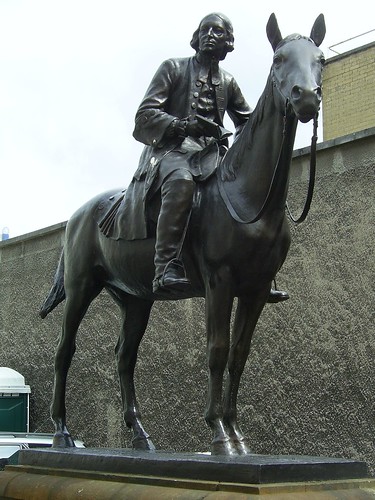We have seen how Captain Foy in Bristol had suggested collecting a penny a week from United Society members in order to deal with the debt upon the Bristol New Room. [The illustration below is John Wesley's statue outside the Bristol New Room.] John Wesley saw the weekly visit of the class leaders as "the very thing we wanted". "The Leaders," he wrote, "are the persons who may not only receive the contributions, but also watch over the souls of their brethren." It became obvious that collecting the pennies each week could be done more easily if the class members were to gather weekly in one place. The class leader became now not a mere collector of class pennies but more significantly a shepherd of the little flock committed to him or her. ... Early Methodism was thus built upon ideals of mutual openness and vulnerability. Spiritual growth was a group activity, not the "flight of the alone to the alone". As Wesley himself stressed: " 'Holy solitaries' is a phrase no more consistent with the Gospel than holy adulterers. The Gospel of Christ knows of no religion but social; no holiness but social holiness." Within the class and band meetings, and in early Methodism generally, "sin" was not so much about the failings of individuals but was focused rather on those things which distort and disrupt community life. Among these, the chief failing was pride, but equally dangerous were envy, covetousness, hypocrisy, gossip and double dealing, all of which made fellowship impossible. In the Christian believer these had to be replaced with the virtues of "social grace" ... (from An Introduction to World Methodism by Kenneth Cracknell and Susan J White, page 125)
The Wesleys have grown on me over the years. John was perhaps a reluctant radical. His approach, as evangelist and spiritual director, was shaped by circumstances. This story shows how he brought together property, finance and spiritual direction. And it was also clear this direction was through fellowship. The wider context was the early Industrial Revolution. The poor were of no interest to the established church of the day. Wesley organised the poor and his methods were widely copied and adapted . Surely he laid the foundations of the working class , long before Marx?
The Christian story is full of solitaries and those who thrive on fellowship. Perhaps we need to reflect on the balance between solitary devotion and spirituality in fellowship? Wesley networked (or connected) many groups of Christians into a single movement; he did it on horseback. Perhaps our individualism does not help us see the benefits where people of faith explore ways of organising or the barriers they create with their incompatible organisations.



Recent Comments